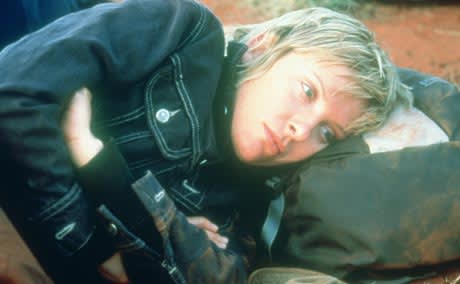Sandy (Toni Collette in a career-defining performance) runs an Australian geology software company that needs a sale. So, she agrees to show visiting Japanese businessman Hiromitsu (Gotaro Tsunashima) around the Pilbara Desert. Instantly, Sandy finds Hiro cold, while Hiro considers her arrogant. They detest each other until they are trapped in the desert. Working together, they escape the harsh Pilbara and fall in love. This is the only predictable moment in a surprising film.
Ostensibly, Japanese Story is a cross-cultural romance but it's told with such subtlety and feeling that this label wears thin. Furthermore, sophomore director Sue Brooks and writer Alison Tilson deserve praise for presenting a romance between an Asian man and a white woman, instead of the typical other way around. In another reversal, Sandy adopts masculine qualities (wearing his pants as they make love), while Hiro (chiselled good looks, sleek limbs) dons the feminine ones.
Japanese Story aches with a longing that is rarely captured on screen (think Wong Kar-Wai's In The Mood For Love). We never know exactly why Hiro travels down under but we feel him escaping from an emptiness as immense as the desert. At the same time, the joy he shares with Sandy feels genuine. They laugh like lovers, like children playing in their secret garden, which in this case is the Pilbara Desert.
Though a rich character study, the script suffers from some flaws: Sandy and Hiro fall in love too suddenly and the third act (without spoiling the ending) coasts to the end. However, the exceptional performances of Tsunashima and, especially, Collette more than make up for these shortcomings. This film will polarise audiences, but Japanese Story achieves the rare feat of getting under your skin long after you've left the theatre. (Capri)
Ostensibly, Japanese Story is a cross-cultural romance but it's told with such subtlety and feeling that this label wears thin. Furthermore, sophomore director Sue Brooks and writer Alison Tilson deserve praise for presenting a romance between an Asian man and a white woman, instead of the typical other way around. In another reversal, Sandy adopts masculine qualities (wearing his pants as they make love), while Hiro (chiselled good looks, sleek limbs) dons the feminine ones.
Japanese Story aches with a longing that is rarely captured on screen (think Wong Kar-Wai's In The Mood For Love). We never know exactly why Hiro travels down under but we feel him escaping from an emptiness as immense as the desert. At the same time, the joy he shares with Sandy feels genuine. They laugh like lovers, like children playing in their secret garden, which in this case is the Pilbara Desert.
Though a rich character study, the script suffers from some flaws: Sandy and Hiro fall in love too suddenly and the third act (without spoiling the ending) coasts to the end. However, the exceptional performances of Tsunashima and, especially, Collette more than make up for these shortcomings. This film will polarise audiences, but Japanese Story achieves the rare feat of getting under your skin long after you've left the theatre. (Capri)
